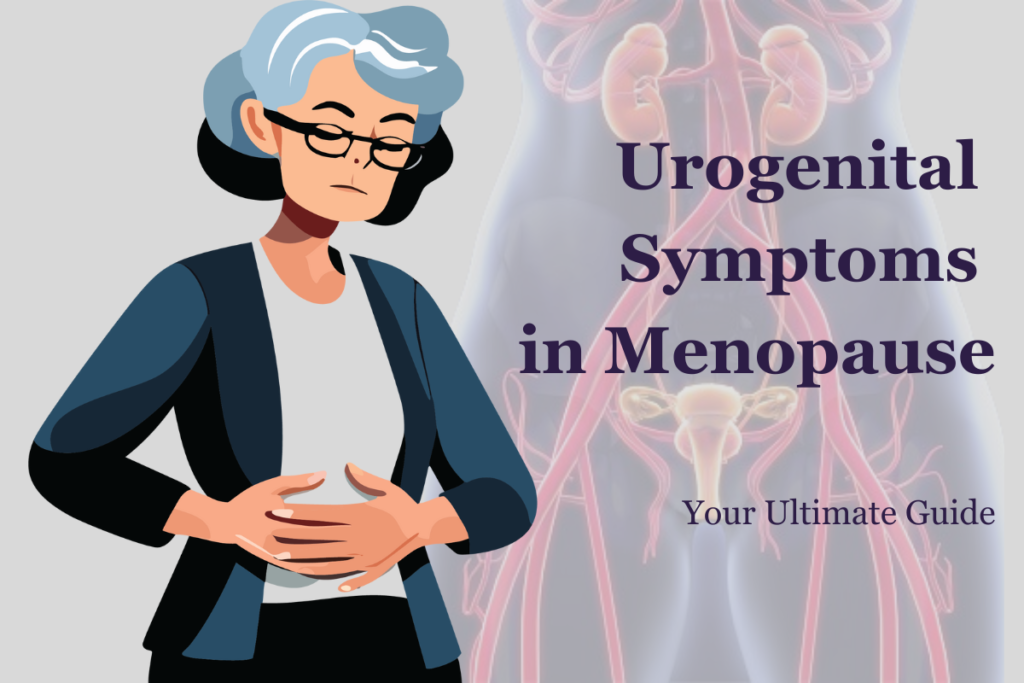Menopause brings urogenital symptoms affecting over 65% of women aged 60 and older. Vaginal dryness, pain during intercourse, urinary issues, and more can disrupt daily life. Shockingly, many women don’t seek help despite effective treatments. This guide breaks down common symptoms and encourages seeking professional help for a better quality of life.
Urogenital symptoms in menopause affect over 65% of women over the age of 60 years and signs gradually worsen with age. The main symptoms are of vaginal dryness, irritation and pain with intercourse. Pain and burning with passing urine, frequency and urgency are common bladder symptoms. Irritable bowel like symptoms also occur around the time of menopause.
How menopause affects the urogenital system and what to do about it
Did you know…
- Over 65% of women over the age of 65 suffer with vaginal dryness which is named as one of the most bothersome of the urogenital symptoms in menopause.
- One in three women will experience urinary incontinence at some point in their lives and particularly as they go through menopause.
- Only 20 – 25 % of women actually seek help for their problems with vaginal dryness, painful intercourse and bladder leakage and even fewer for bowel related problems as they go through menopause.
- Over 60% of women who do seek help do not get the treatment they need even though it is easily available and evidence-based.
- 50% of women over the age of 50 will stop having intercourse because of urogenital symptoms in menopause.
- Urogenital symptoms in menopause in particular vaginal dryness and painful intercourse affects sexual function and can cause relationship difficulties
- Significant skin changes of the vulva at menopause are never discussed and can lead to cancer if not diagnosed or treated correctly.
Urogenital symptoms in menopause are bothersome and significantly affect quality of life
Here is a summary of urogenital symptoms in menopause that we will discuss in this article
Menopause and vulvovaginal atrophy (including vaginal dryness, irritation, pain with intercourse and urinary symptoms) – also called genitourinary syndrome of menopause
Bladder problems in menopause
Pelvic floor dysfunction in menopause and prolapse
Vulval skin changes in menopause
Bowel problems in menopause
“Suffice to say that urogenital symptoms of menopause are extremely common and significantly affect a woman’s quality of life. In each section I will highlight the common symptoms that women face. If you identify with any of them, please see your doctor and seek help for them. It is important to talk about your problems so that you can get the help you need – this is available and effective in relieving much of the distress these problems cause.”
Conclusion:
Urogenital symptoms during menopause are prevalent but often overlooked. From vaginal dryness to bladder problems, seeking help is crucial. Sadly, many women suffer in silence, unaware of available treatments. This guide emphasises the importance of discussing symptoms with a doctor for effective relief and improved well-being.
Do write to me at masterthemenopause@gmail.com about what you liked in this article and whether it helped you address some of your concerns.
References:
Traditional suburethral sling operations for urinary incontinence in women. Rehman H, Bezerra CCB, Bruschini H, Cody JD. Cochrane Database of Systematic Reviews 2011, Issue 1. Art. No.: CD001754. DOI: 10.1002/14651858.CD001754.pub3.
Adrenergic drugs for urinary incontinence in adults. Alhasso A, Glazener CMA, Pickard R, N’Dow JMO. Cochrane Databaseof Systematic Reviews 2005, Issue 3. Art. No.: CD001842. DOI: 10.1002/14651858.CD001842.pub2.
Oestrogen therapy for urinary incontinence in post-menopausal women. Cody JD, Richardson K, Moehrer B, Hextall A, Glazener CMA. Cochrane Database of Systematic Reviews2009, Issue 4. Art. No.: CD001405. DOI:10.1002/14651858.CD001405.pub2.
Bladder training for urinary incontinence in adults. Wallace SA, Roe B, Williams K, Palmer M. Cochrane Database of Systematic Reviews 2004, Issue 1. Art. No.: CD001308. DOI: 10.1002/14651858.CD001308.pub2
Urinary incontinence in postmenopausal women – causes, symptoms, treatment. Gabriela Kołodyńska, Maciej Zalewski, and Krystyna Rożek-Piechura. Prz Menopauzalny. 2019 Apr; 18(1): 46–50.Published online 2019 Apr 9. doi: 10.5114/pm.2019.84157. https://www.ncbi.nlm.nih.gov/pmc/articles/PMC6528037/

